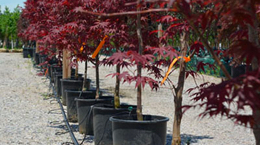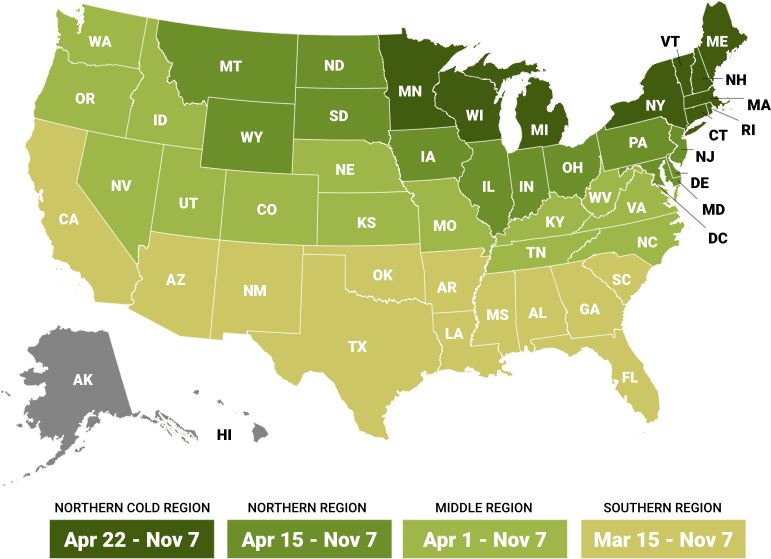
Growing zones
See Zone Map >Status: In stock
- Sun, Part Sun/Shade
Mature Plant Size (H x W): 24-36" x 24-36"
Bloom Season: Summer, Fall
- Attracts Bees
- Deer Resistant
- Drought Tolerant
- Native
- Award Winning
- Edible to People
- Attracts Butterflies
- Cut Flower
- Fragrant Flowers
- Fragrant Leaves
- Attracts Pollinators
Planting & Care for Clustered Mountain Mint
Planting
- Choose the Right Spot – Plant in full sun to partial shade for best growth. It tolerates various soil types but prefers well-draining soil.
- Soil: Clustered Mountain Mint thrives in moist, well-draining soil with a preference for clay/heavy soil. It can tolerate a range of soil types, as long as there is good drainage. While it prefers moderately fertile soil, it can also adapt to lean or poor soils once established.
- Planting Time: Spring or fall is the best time to plant, allowing the plants to establish roots before extreme temperatures.
- Spacing: Space plants about 18-24" apart to allow them room to grow and spread.
Watering
- Watering Frequency: Water sparingly, allowing the soil to dry out between waterings.
- Avoid Overwatering: Overwatering can cause root rot and damage the plant. Adjust watering according to weather conditions.
Fertilizing
- Fertilizer Type: Use a balanced, water-soluble fertilizer designed for succulents. Apply during the growing season (spring and summer) at half strength.
- Application: Follow the instructions on the fertilizer packaging for appropriate dilution and application.
Mulching
- Mulch: Apply a thin layer of gravel or pebbles around the base of the plant to retain moisture and prevent weeds. Avoid mulching too close to the center of the rosette.
Pruning and Maintenance
- Trimming: Cut back in late fall or early spring to encourage fresh growth. Deadheading isn’t necessary but can help maintain a tidy appearance.
Winter Care
- Cold Protection: In colder climates, you can cover the plants or move them indoors during winter months to protect them from freezing temperatures.
Pests and Diseases
- Pests: Keep an eye out for aphids, mealybugs, and spider mites. Treat any infestations promptly with insecticidal soap or neem oil.
- Diseases: Proper watering and well-draining soil can help prevent root rot, which is a common issue with succulents. Ensure good air circulation around the plants to prevent fungal problems.
Planting & Handling Help
Download our Planting and Handling Guide below to plan for a successful arrival and install of your plants. Be sure to water all plants as soon as they arrive and every day until you’re ready to plant. Keep any bare root bundles in a shady, cool spot with the roots covered at all times.


Learn More
Watch our videos on handling bare root plants, how your order is prepared for shipment and more.


Plant Sizing
What is the difference between Containers, Grow Bags, Bare Root, and Balled & Burlap (B&B)?
Shipping Times


Our FedEx and local shipping times depend on two factors, one is by the region and the second is the type of product being shipped. For example, small fruits are only shipped in spring, but majority of our perennials are shipped from spring until fall. Keep in mind the dates below act as a general guide. Due to unpredictable weather, staffing, inventory and industry demands these timelines can change. Therefore, we cannot guarantee any of these times.
Shipping Dates by Region*
Northern Cold Region: April 22nd - November 7th
Northern Region: April 15th - November 7th
Middle Region: April 1st - November 7th
Southern Region: March 15th - November 7th
Local Delivery (small radius from Waterloo, WI): April 22nd - November 7th
Shipping Dates by Season*
Spring Shipping: Region Start Date (above) - May
Fall Shipping: September - November
Due to unpredictable weather, these times may vary. Some varieties are exceptions due to heat and plant health reasons. Enter your shipping zip code at the top of this page and be sure to check the shipping information on each product before you add it to your cart. If the product is too large or restricted in your state, you will not be able to checkout with that item in your cart.
